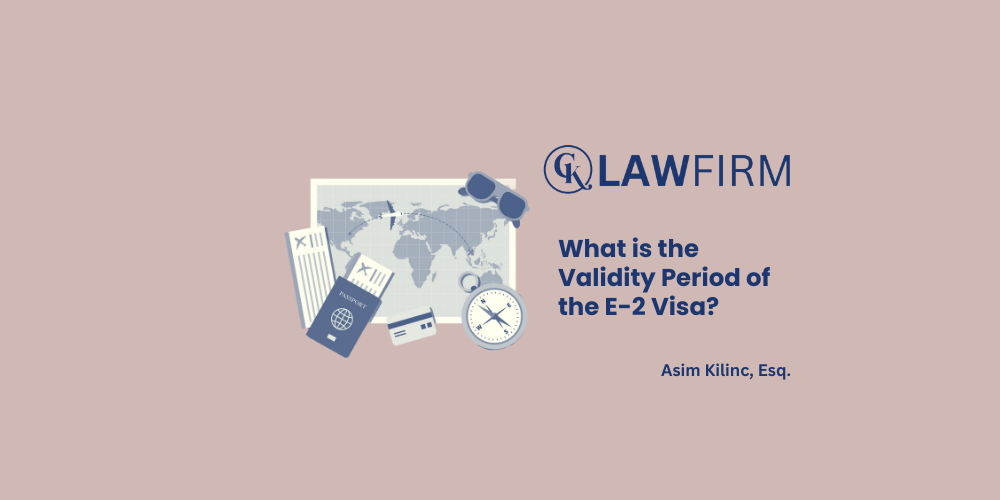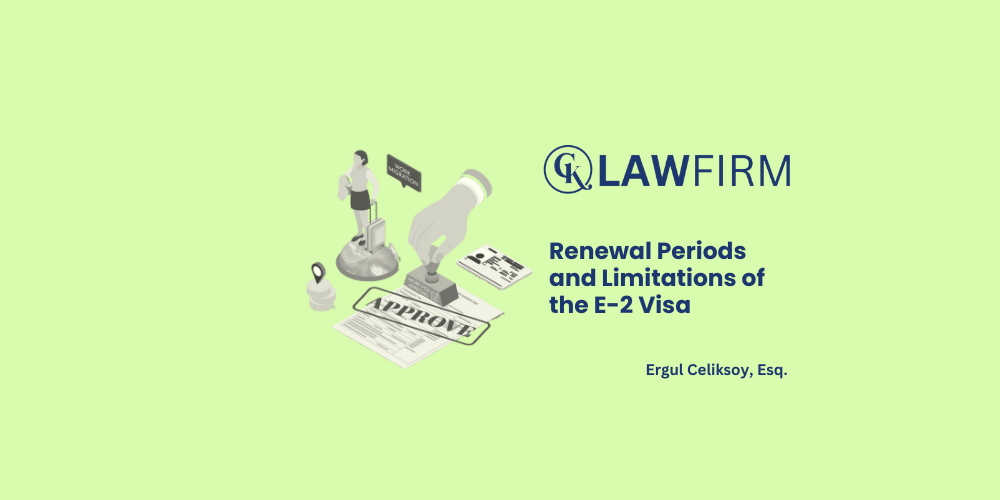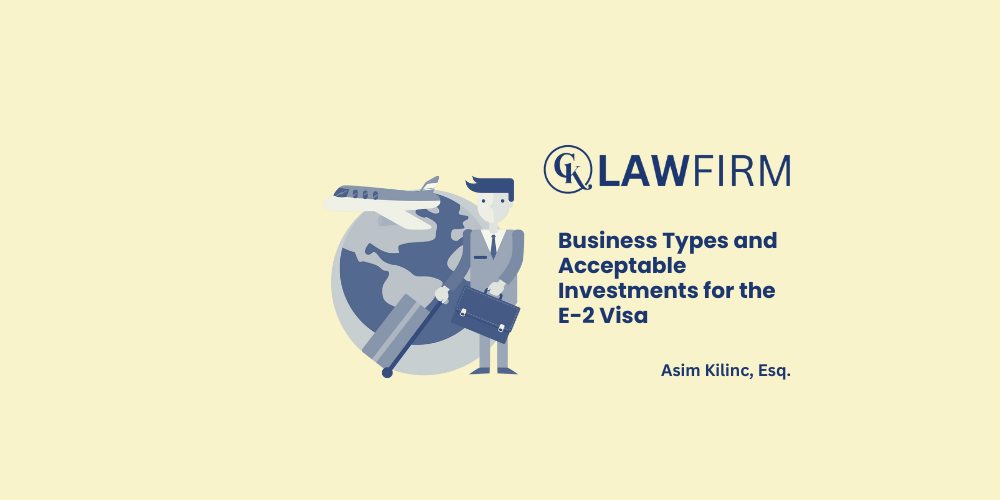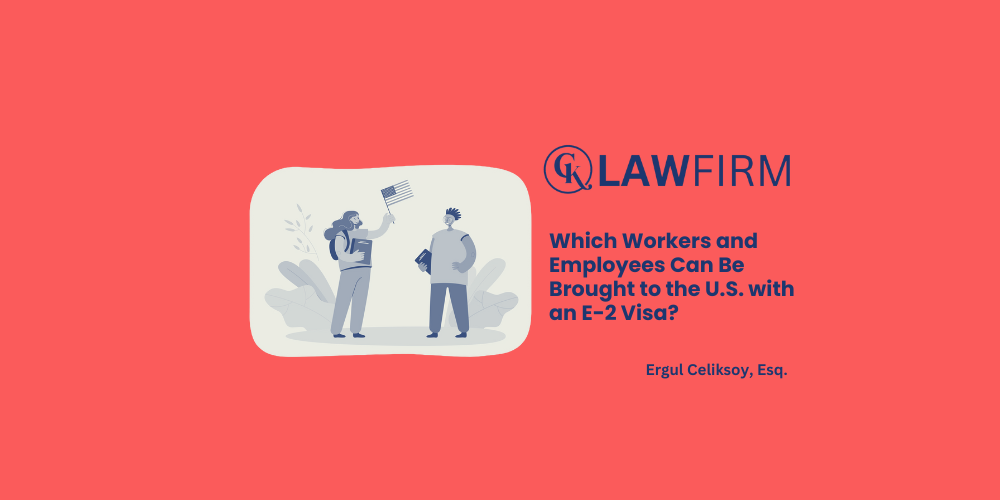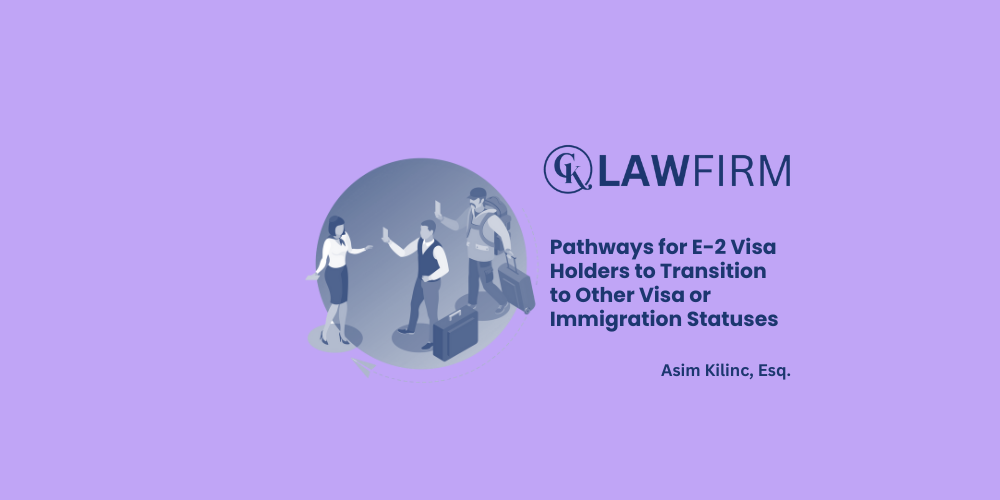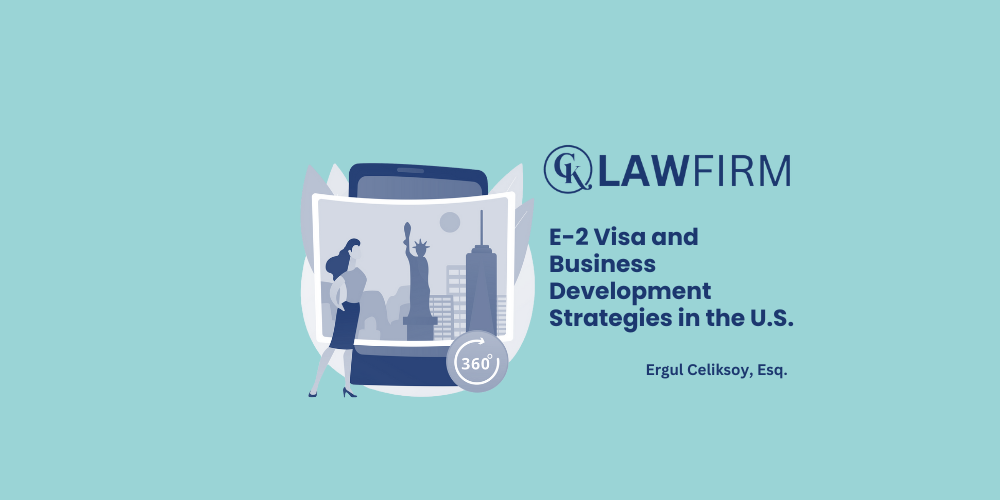Schedule an Appointment with Our Attorneys Now
By Asim Kilinc, Immigration Attorney at CK Law Firm
The E-2 visa is a temporary visa designed for individuals who wish to reside in the United States as investors. Like other nonimmigrant visas, it is subject to specific validity periods. The validity of the E-2 visa depends on international agreements between the applicant’s home country and the U.S. and the investment activities of the visa holder. In this article, we will explore the validity period of the E-2 visa and the factors affecting it in detail:
- Initial Period and First Issuance of the E-2 Visa
- Renewal and Extension of the E-2 Visa
- Factors Influencing the Validity Period
If you have further questions about the E-2 visa, feel free to leave a comment below, send me a message directly via LinkedIn, or contact me through the CK Law Firm website.
Initial Period and First Issuance of the E-2 Visa
The initial period of the E-2 visa is determined by the trade and investment agreements between the applicant’s home country and the United States. Typically:
- Initial Duration: This visa is generally issued with a validity period of 2 years.
- Maximum Duration: This varies by country. For example, Turkish nationals can receive an E-2 visa with a maximum validity of 5 years.
It’s important to note that this validity period pertains to the visa itself and is different from the 2-year stay granted upon each entry into the U.S. As long as the visa remains valid, the holder may enter the U.S. and stay for up to 2 years per entry.
Renewal and Extension of the E-2 Visa
The E-2 visa can be renewed an unlimited number of times, provided specific conditions are met. During each renewal process, the following criteria must be satisfied:
- Continuity of the Investment
The business must remain active and contribute to the U.S. economy. If the business ceases operations or becomes unprofitable, the renewal application may be denied. - Updated Documentation
Renewal applications must include updated documentation proving that the investment remains valid and the business operates legally. These documents often include financial reports, tax returns, and business plans. - Timely Application
Renewal applications must be submitted before the visa’s expiration date. Failure to do so may result in the loss of legal status and the need to leave the U.S. - Active Management by the Investor
The investor must continue to play an active role in managing the business. Applications from passive investors are generally not accepted.
Factors Influencing the Validity Period
Several key factors influence the validity period of the E-2 visa:
- Nationality of the Applicant
The validity period of this visa varies depending on the applicant’s nationality. For example:- Turkish nationals: Up to 5 years.
- German nationals: Up to 2 years.
- Performance of the Business
The business’s growth rate, financial success, and contribution to the U.S. economy play a critical role in visa renewals. A failing business may jeopardize the visa holder’s status in the U.S. - Nonimmigrant Status Requirements
Since the E-2 visa is a nonimmigrant visa, applicants must demonstrate their intent to remain in the U.S. temporarily. Any indication of plans for permanent residency may complicate the renewal process. - Consulate and USCIS Decisions
Decisions made by consular officers or U.S. Citizenship and Immigration Services (USCIS) during the renewal process are significant. Submitted documents are thoroughly reviewed, and the validity of the visa is extended based on these evaluations.
Conclusion
The E-2 visa offers a flexible option for entrepreneurs looking to invest in the U.S. without being limited by a strict timeline. However, attention must be paid to its initial duration, renewal conditions, and validity periods. Any errors in managing these processes can jeopardize an investor’s business plans and legal status in the U.S.
At CK Law Firm, we provide professional support through all stages of the E-2 visa validity and renewal process. To sustain your U.S. investment and navigate the legal process smoothly, contact us at cklawfirm.org, via email at info@cklawfirm.org, or directly on LinkedIn.
Who is Attorney Asım Kılınç?
Attorney Asım Kılınç is the co-founder of CK Law Firm and is recognized for his expertise in immigration law and U.S. asylum applications. Kılınç completed his Master’s degree at Southern Methodist University Dedman School of Law and is a member of the Missouri Bar Association, with a focus on U.S. immigration law.
Attorney Kılınç’s extensive knowledge and experience in immigration law have significantly contributed to CK Law Firm’s success in this field. He has actively participated in the preparation of over 1,000 cases, demonstrating his expertise in this area. By providing comprehensive and professional legal support to his clients, he helps them adapt to their new lives in the U.S.
Attorney Kılınç is also well-versed in U.S. asylum applications. He meticulously guides his clients through the process and ensures they receive the best legal advice. He provides top-quality service to clients in matters of citizenship, Green Card, work permits, and other immigration processes, supporting them from start to finish on their journey to U.S. citizenship.
Attorney Asım Kılınç, who solidifies CK Law Firm’s leadership in immigration law and U.S. asylum applications, offers reliable and effective legal consultancy services to clients, assisting them in building a new life in the U.S.
By Ergul Celiksoy, Immigration Attorney at CK Law Firm
The E-2 visa is a flexible option that allows investors to live and work in the United States. However, understanding the visa’s validity periods and renewal conditions plays a crucial role in planning your stay in the U.S. In this article, we provide detailed information about the E-2 visa’s validity, renewal requirements, and potential limitations:
- Validity Period of the E-2 Visa
- Conditions for Renewing the E-2 Visa
- Limitations and Considerations in the Renewal Process
- Long-Term Planning with the Renewability of the E-2 Visa
If you have any additional questions about the E-2 visa, feel free to leave a comment below, message me directly on LinkedIn, or contact me through the CK Law Firm website!
Validity Period of the E-2 Visa
The validity of the E-2 visa depends on the treaties between the applicant’s home country and the U.S. Each country has specific maximum validity periods. Generally:
- Initial Period: The visa is initially issued for a validity period of 2 years.
- Maximum Period: For some countries, the total validity can extend up to 5 years.
- Duration of Stay: As long as the visa remains valid, each entry into the U.S. grants an additional 2-year stay.
Investors can file for a renewal before the visa expires, allowing them to continue living in the U.S. This flexibility makes long-term business planning easier for investors.
Conditions for Renewing the E-2 Visa
The E-2 visa can be renewed an unlimited number of times, provided that specific conditions are met. Each renewal application must demonstrate the following:
- Sustained Investment
Applicants must prove that their investment remains active and profitable. Documentation must show that the business contributes to the U.S. economy and continues its commercial activities. - Contribution to the U.S. Economy
The business must continue to create jobs or provide economic benefits to the U.S. Key factors such as employee count and business growth rates are critical in renewal applications. - Active Role of the Investor
Investors must demonstrate active involvement in the daily management or strategic decision-making of the business. Applications from passive investors are not accepted. - Intent to Maintain Current Status
The applicant must confirm that they do not intend to change their status to a different visa or residency type. This ensures the E-2 visa remains a temporary status.
Limitations and Considerations in the Renewal Process
While the E-2 visa is renewable, applicants should be aware of potential challenges during the renewal process:
- Investment Size and Profitability
Renewal applications may be denied if the business is not sufficiently large or profitable. Detailed financial statements and growth metrics should be carefully prepared. - Incomplete Documentation
Missing or incorrect information in the renewal application can lead to denial. All documents proving the legitimacy of the investment must be complete. - Expiration of Visa Validity
Applicants must submit their renewal applications before the visa’s expiration date. Delays can result in the loss of legal status. - Consulate and USCIS Review Process
Both consulates and USCIS conduct thorough reviews of every application. New assessments may occur during the renewal process, making accurate and complete documentation crucial.
Long-Term Planning with the Renewability of the E-2 Visa
The E-2 visa enables investors to achieve long-term business goals in the U.S. Its unlimited renewability offers a significant advantage over other nonimmigrant visa types. However, professional support is essential to ensure the visa’s sustainability.
At CK Law Firm, we proactively identify challenges that may arise during the E-2 visa renewal process and provide comprehensive services to ensure a smooth experience. Reach out to us to maintain your business success in the U.S.
For professional support, detailed information, and consulting services, contact us at cklawfirm.org, via email at info@cklawfirm.org, or directly through LinkedIn.
Who is Attorney Ergül Çeliksoy?
Attorney Dr. Ergül Çeliksoy is a founding partner of CK Law Firm and also serves as an Assistant Professor of Law at the University of Nottingham. With extensive experience in U.S. immigration law, Dr. Çeliksoy completed a Master’s degree in international law and human rights law at the University of Nottingham in 2017, followed by a Ph.D. at the same university. His Ph.D., completed in 2022 at the University of Nottingham School of Law, marked a significant milestone in his academic career. Dr. Çeliksoy has published extensively in leading academic journals and is internationally recognized for his expertise in modern slavery, criminal justice, and criminal law. As a member of the California Bar, Dr. Çeliksoy offers exceptional service to his clients, particularly in U.S. immigration law cases. His expertise and experience in immigration law significantly contribute to CK Law Firm’s work in this area.
Dr. Çeliksoy provides comprehensive and strategic solutions to his clients in immigration law cases, helping secure their legal status in the U.S. His work on human rights and immigration processes, particularly in modern slavery and criminal law, effectively addresses the complex legal issues immigrants face. Dr. Çeliksoy reinforces CK Law Firm’s leadership in immigration law by offering reliable and effective legal consulting services to his clients, helping them build new lives in the United States.
By Asim Kilinc, Immigration Attorney at CK Law Firm
The E-2 visa grants immigration status to individuals who wish to invest and start a business in the U.S. However, to benefit from this visa, the investment must meet certain criteria, and the type of business must fall within acceptable categories. In this article, we will delve into the types of businesses eligible for the E-2 visa and the characteristics of acceptable investments:
- Types of Businesses Eligible for the E-2 Visa
- Characteristics of Acceptable Investments
- Key Considerations During the E-2 Visa Investment Process
If you have additional questions about the E-2 visa, feel free to contact me via the comments section below, directly on LinkedIn, or through the CK Law Firm Immigration Attorneys’ website.
Types of Businesses Eligible for the E-2 Visa
While the type of business is important, the most critical requirement is that the business engages in “active” commercial activities. Passive investments do not qualify under this visa category.
Active Businesses
The business must actively produce goods or services. Examples include:
- Restaurants, cafes, or hotels.
- Retail stores or e-commerce platforms.
- Technology startups or consulting firms.
Small and Medium-Sized Businesses
The E-2 visa is generally suitable for small and medium-sized businesses. Companies with the potential to contribute to the U.S. economy hold an advantage in the visa process.
Franchise Businesses
Franchise models are a popular option for E-2 visa applicants. These businesses offer a pre-established operational model and support system, making them appealing for both investors and the U.S. government.
Service- or Manufacturing-Based Businesses
Businesses in the service sector (e.g., consulting, accounting) or manufacturing companies are eligible for the E-2 visa.
Important Considerations:
Passive investments (e.g., simply purchasing property) or businesses that generate personal income only (e.g., individual real estate management) are not considered eligible for the E-2 visa.
Characteristics of Acceptable Investments
Investments made for the E-2 visa must meet specific standards. Acceptable investments have the following characteristics:
Substantial Investment Amount
The amount of investment depends on the type and scale of the business, but it must be “substantial.” A substantial investment means an amount sufficient to ensure the successful operation of the business.
- For small businesses, an investment between $100,000 and $150,000 is typically considered sufficient.
- Larger businesses may require a higher investment amount.
At-Risk Capital
The investment must demonstrate that the investor is taking a financial risk. This means that the investment’s entirety or a significant portion should be allocated to the establishment and operation of the business. Examples include:
- Purchasing equipment, products, and materials for the business.
- Leasing or purchasing business premises.
- Covering employee salaries and marketing expenses.
Avoidance of Speculative or Passive Investments
Only profit-oriented and actively managed businesses are eligible for the E-2 visa. For example, purchasing a property solely for rental purposes is considered speculative and will not qualify.
Contribution to the U.S. Economy
The business must have the potential to contribute to the U.S. economy, such as creating jobs or providing economic benefits to the local community.
Key Considerations During the E-2 Visa Investment Process
When making an investment for the E-2 visa, the following steps are crucial:
Preparation of a Business Plan
A detailed business plan outlining the financial projections, objectives, and operational plans of the business is mandatory. The business plan will be used to demonstrate that the investment is legitimate and beneficial to the U.S. economy.
Document Preparation
The source of the investment and its legality must be documented with supporting evidence. CK Law Firm provides comprehensive legal assistance to ensure your investment complies with the requirements.
Completion of the Investment
The investment must be completed before this visa application. All expenditures during the business establishment process should be meticulously documented.
Seeking Professional Guidance
Professional advice on selecting the business type and navigating the investment process is essential for a smooth application process.
Conclusion
The E-2 visa offers a valuable opportunity for entrepreneurs seeking to establish a business and invest in the U.S. However, selecting an appropriate business type and making an acceptable investment are critical steps. The rejection of passive investments is an important criterion that applicants must consider.
At CK Law Firm, we provide professional consulting services to assist with determining the type of business, structuring acceptable investments, and managing the application process for the E-2 visa. For professional support, detailed information, and consultation services, contact us via cklawfirm.org, info@cklawfirm.org, or LinkedIn.
Who is Attorney Asım Kılınç?
Attorney Asım Kılınç is the co-founder of CK Law Firm and is recognized for his expertise in immigration law and U.S. asylum applications. Kılınç completed his Master’s degree at Southern Methodist University Dedman School of Law and is a member of the Missouri Bar Association, with a focus on U.S. immigration law.
Attorney Kılınç’s extensive knowledge and experience in immigration law have significantly contributed to CK Law Firm’s success in this field. He has actively participated in the preparation of over 1,000 cases, demonstrating his expertise in this area. By providing comprehensive and professional legal support to his clients, he helps them adapt to their new lives in the U.S.
Attorney Kılınç is also well-versed in U.S. asylum applications. He meticulously guides his clients through the process and ensures they receive the best legal advice. He provides top-quality service to clients in matters of citizenship, Green Card, work permits, and other immigration processes, supporting them from start to finish on their journey to U.S. citizenship.
Attorney Asım Kılınç, who solidifies CK Law Firm’s leadership in immigration law and U.S. asylum applications, offers reliable and effective legal consultancy services to clients, assisting them in building a new life in the U.S.
By Ergul Celiksoy, Immigration Attorney at CK Law Firm
The E-2 visa not only offers opportunities for investors but also enables certain qualified workers and employees to work in the U.S. Bringing the skilled employees your business needs to the U.S. is critical for the success and growth of your business. In this article, we’ll provide information about the types of employees that can be brought to the U.S. under the E-2 visa, the requirements, and the application processes:
- Types of Employees That Can Be Brought with an E-2 Visa
- Requirements for Eligible Employees
- The Process of Bringing Employees to the U.S. with an E-2 Visa
- Rights for Family Members of Employees
If you have additional questions about the E-2 visa, feel free to reach out through the comments section below, directly via LinkedIn, or through our CK Law Firm Immigration Attorneys’ website!
Types of Employees That Can Be Brought with an E-2 Visa
The E-2 visa allows two main categories of employees to be brought to the U.S.:
E-2 Executives and Specialists (Executive/Managerial Employees)
Executives who manage the company’s operations or specialists with unique skills that contribute to the growth of the business can be brought to the U.S. with an E-2 visa.
- Executive Positions: Individuals responsible for managing the business broadly or making critical decisions. These roles are strategically important for the company’s success.
- Specialist Employees: Individuals with specific knowledge, experience, or technical skills required for the company’s operations.
E-2 Essential Workers (Essential Employees)
Essential workers are individuals with skills critical for the successful operation of the business. These employees can be brought to the U.S. when no local alternatives are available. For example, personnel with technical expertise or unique knowledge related to a particular product or service may fall into this category.
Requirements for Eligible Employees
To bring employees to the U.S. with an E-2 visa, certain criteria must be met:
- Citizenship Requirement: The employee must be a citizen of one of the E-2 treaty countries that the investor is also a citizen of.
- Job Qualification: The position must be crucial for the company’s operations. Especially for executives or specialized workers, the role’s contribution to the business must be documented.
- Company Necessity: The employee’s presence must be critical for the business. If there are no suitable candidates in the U.S. labor market, this must be demonstrated with evidence.
Proper documentation of these requirements is essential for a successful visa application process.
The Process of Bringing Employees to the U.S. with an E-2 Visa
The steps to bring employees to the U.S. are as follows:
- Defining the Position: Determine the duties, responsibilities, and skills required for the roles needed by the business.
- Visa Application Process: Complete the necessary documentation for employees and apply through U.S. consulates. This includes providing company details, investment specifics, and proof of workforce needs.
- Consular Interview: Employees must complete an interview at the consulate to gain entry to the U.S. During this stage, the employee’s job position and contributions to the business should be clearly explained.
Any errors or omissions during the visa process can lead to application denial.
Rights for Family Members of Employees
Employees brought to the U.S. with an E-2 visa can also bring their spouses and children under 21 years of age. Spouses can apply for work authorization in the U.S., and children can access educational opportunities. This is a significant advantage that makes relocating to the U.S. more appealing.
Conclusion
It’s clear that bringing employees to the U.S. with an E-2 visa can make a significant contribution to the success of your business. However, this process requires accurate documentation and a strategic approach. The qualifications of the employees, their contributions to the business, and compliance with legal requirements are crucial.
At CK Law Firm, we provide comprehensive consulting services to E-2 visa holders and businesses aiming to bring their employees to the U.S. To expand your workforce, boost your business’s success, and receive professional support, contact us via our website at cklawfirm.org, by email at info@cklawfirm.org, or through LinkedIn.
Who is Attorney Ergül Çeliksoy?
Attorney Dr. Ergül Çeliksoy is a founding partner of CK Law Firm and also serves as an Assistant Professor of Law at the University of Nottingham. With extensive experience in U.S. immigration law, Dr. Çeliksoy completed a Master’s degree in international law and human rights law at the University of Nottingham in 2017, followed by a Ph.D. at the same university. His Ph.D., completed in 2022 at the University of Nottingham School of Law, marked a significant milestone in his academic career. Dr. Çeliksoy has published extensively in leading academic journals and is internationally recognized for his expertise in modern slavery, criminal justice, and criminal law. As a member of the California Bar, Dr. Çeliksoy offers exceptional service to his clients, particularly in U.S. immigration law cases. His expertise and experience in immigration law significantly contribute to CK Law Firm’s work in this area.
Dr. Çeliksoy provides comprehensive and strategic solutions to his clients in immigration law cases, helping secure their legal status in the U.S. His work on human rights and immigration processes, particularly in modern slavery and criminal law, effectively addresses the complex legal issues immigrants face. Dr. Çeliksoy reinforces CK Law Firm’s leadership in immigration law by offering reliable and effective legal consulting services to his clients, helping them build new lives in the United States.
By Asim Kilinc, Immigration Attorney at CK Law Firm
While the E-2 visa is an attractive option for individuals seeking to start and manage a business in the U.S., it provides only a temporary status. E-2 visa holders who wish to reside permanently in the U.S. may consider transitioning to other visa or immigration statuses. This article explores the available pathways and key considerations for E-2 visa holders:
- Transitioning to an EB-5 Investor Visa
- Employer-Sponsored Green Card Applications
- Marriage or Family-Based Green Card Applications
- Extraordinary Ability Visas: EB-1 or O-1
- Switching to Another Temporary Visa (H-1B or L-1 Visas)
If you have additional questions about the E-2 visa, feel free to leave a comment below this article, message me directly on LinkedIn, or contact me via the CK Law Firm website.
Transitioning to an EB-5 Investor Visa
One of the most common pathways for E-2 visa holders is transitioning to an EB-5 investor visa. The EB-5 visa allows individuals who meet specific investment and job creation requirements to directly obtain a Green Card.
Requirements for the EB-5 Visa:
- A minimum investment of $1,000,000 (or $800,000 in targeted employment areas).
- Creation of at least 10 full-time jobs for U.S. workers.
E-2 investors can meet these requirements by expanding their existing businesses or making new investments.
Employer-Sponsored Green Card Applications
E-2 visa holders can obtain immigrant status through employer sponsorship. These applications are typically made under the EB-2 (Advanced Degree or Exceptional Ability) or EB-3 (Skilled Worker) categories.
Requirements for EB-2 or EB-3 Categories:
- An employer must commit to hiring the applicant and complete the Labor Certification process.
- EB-2 applicants must possess an advanced degree or demonstrate exceptional abilities that qualify for a National Interest Waiver (NIW).
While E-2 visa holders cannot sponsor themselves through their own business, they can apply through another employer. CK Law Firm can assist in navigating the legal requirements of employer-sponsored Green Card applications.
Marriage or Family-Based Green Card Applications
E-2 visa holders may also obtain immigrant status through sponsorship by a U.S. citizen or Green Card-holding family member. Marriage to a U.S. citizen is one of the fastest and most direct methods.
Requirements for Family-Based Green Card Applications:
- Sponsorship by a U.S. citizen or Green Card-holding spouse, child, or parent.
- Documentation of family relationship and financial support eligibility.
Family-based applications are often faster than other methods, but it is essential to prepare accurate and complete documentation. CK Law Firm provides professional guidance in family-based Green Card applications.
Extraordinary Ability Visas: EB-1 or O-1
E-2 visa holders can apply for extraordinary ability visas, such as EB-1 or O-1, by demonstrating exceptional achievements in their field. These visas are suitable for individuals with international recognition in areas such as arts, sciences, business, or sports.
Requirements for EB-1 or O-1 Visas:
- Documentation of extraordinary achievements in the field.
- Evidence such as national or international awards, publications, or references from recognized organizations.
These visas offer a faster route to immigration status. At CK Law Firm, we help applicants successfully navigate the application process for these visa types.
Switching to Another Temporary Visa (H-1B or L-1 Visas)
E-2 visa holders may also consider transitioning to other temporary visas, such as H-1B (Specialty Occupations) or L-1 (Intra-Company Transfer) visas.
Requirements for H-1B and L-1 Visas:
- H-1B applicants must work in a specialty occupation requiring advanced knowledge.
- L-1 applicants must transfer to a U.S. branch of an international company.
Switching to temporary visas can serve as a bridge to long-term immigration status.
Conclusion
E-2 visa holders have several options to achieve their long-term goals in the U.S. Options such as the EB-5 investor visa, employer sponsorship, family-based applications, or extraordinary ability visas can lead to success with the right strategy and professional guidance.
At CK Law Firm, we specialize in identifying the best pathways for E-2 visa holders and managing the transition process. For professional support, detailed information, and consultation services, contact us via cklawfirm.org, email us at info@cklawfirm.org, or connect with us on LinkedIn.
Who is Attorney Asım Kılınç?
Attorney Asım Kılınç is the co-founder of CK Law Firm and is recognized for his expertise in immigration law and U.S. asylum applications. Kılınç completed his Master’s degree at Southern Methodist University Dedman School of Law and is a member of the Missouri Bar Association, with a focus on U.S. immigration law.
Attorney Kılınç’s extensive knowledge and experience in immigration law have significantly contributed to CK Law Firm’s success in this field. He has actively participated in the preparation of over 1,000 cases, demonstrating his expertise in this area. By providing comprehensive and professional legal support to his clients, he helps them adapt to their new lives in the U.S.
Attorney Kılınç is also well-versed in U.S. asylum applications. He meticulously guides his clients through the process and ensures they receive the best legal advice. He provides top-quality service to clients in matters of citizenship, Green Card, work permits, and other immigration processes, supporting them from start to finish on their journey to U.S. citizenship.
Attorney Asım Kılınç, who solidifies CK Law Firm’s leadership in immigration law and U.S. asylum applications, offers reliable and effective legal consultancy services to clients, assisting them in building a new life in the U.S.
By Ergul Celiksoy, Immigration Attorney at CK Law Firm
The E-2 visa is a powerful tool that allows investors to establish and manage a business in the United States. However, achieving success under this visa requires the implementation of effective business development strategies. In this article, we detail strategies to help E-2 visa holders grow their businesses and build a successful enterprise in the U.S.:
- Understanding the U.S. Market and Updating Your Business Plan
- Effective Marketing and Brand Management Strategies
- Expanding Your Business and Increasing Your Investment
If you have additional questions about the E-2 visa, feel free to leave a comment below this article, message me directly on LinkedIn, or contact me via the CK Law Firm website.
Understanding the U.S. Market and Updating Your Business Plan
The first step to building a successful business in the U.S. is understanding your target market. The U.S. has a vast and diverse consumer base, and businesses must consider regional and sectoral differences.
Creating a solid business plan is essential for an E-2 visa application, but it should also be updated regularly after the visa is approved. You can follow these steps to improve your business plan:
- Market Research: Analyze the needs, expectations, and purchasing habits of your target customers.
- Competitive Analysis: Identify your competitors and develop strategies to differentiate your business.
- Goal Setting: Define short-, medium-, and long-term goals for your business and take concrete steps to achieve them.
Effective Marketing and Brand Management Strategies
To succeed in the U.S. market, it’s essential to develop a robust marketing and brand management strategy. Combine traditional and digital marketing methods to promote your products and services.
Marketing Strategies:
- Digital Marketing: Leverage social media platforms and tools like Google Ads to reach your target audience effectively.
- Local Advertising: Conduct local ad campaigns to engage customers in your business area.
- Word-of-Mouth Marketing: Enhance customer satisfaction to encourage positive feedback and referrals.
Brand Management:
- Build a strong brand identity to gain customer trust.
- Enhance your business’s credibility with a professional logo and website design.
- Strengthen customer relationships by offering after-sales support.
Remember to comply with U.S. legal regulations during this process. CK Law Firm can assist you in ensuring legal compliance while developing your business strategies.
Expanding Your Business and Increasing Your Investment
Another key aspect of business development under the E-2 visa is increasing your investment and expanding your business. Consider the following strategies to grow your business in the U.S.:
- Opening Branches or New Locations: Expand your customer base by opening new locations.
- Developing New Products or Services: Retain existing customers and attract new ones by broadening your product or service portfolio.
- Seeking Investors or Partnerships: Strengthen your business financially by obtaining support from investors or strategic partners.
Paying close attention to legal regulations and visa requirements is critical during the growth process. Specifically, your business’s financial health and employment policies play a significant role in E-2 visa renewal.
Conclusion
The E-2 visa provides an excellent opportunity to establish and grow a business in the U.S. However, achieving success requires implementing the right strategies and adhering to legal regulations. To grow your business in the U.S., plan every step carefully, from market research to marketing strategies, investment expansion, and legal compliance.
At CK Law Firm, we take pride in offering professional support throughout your journey of establishing and developing a business under the E-2 visa. Contact us to maximize the advantages of your E-2 visa and grow your business.
For professional assistance, detailed information, and consultation services, reach out to us at cklawfirm.org, email us at info@cklawfirm.org, or message us on LinkedIn.
Who is Attorney Ergül Çeliksoy?
Attorney Dr. Ergül Çeliksoy is a founding partner of CK Law Firm and also serves as an Assistant Professor of Law at the University of Nottingham. With extensive experience in U.S. immigration law, Dr. Çeliksoy completed a Master’s degree in international law and human rights law at the University of Nottingham in 2017, followed by a Ph.D. at the same university. His Ph.D., completed in 2022 at the University of Nottingham School of Law, marked a significant milestone in his academic career. Dr. Çeliksoy has published extensively in leading academic journals and is internationally recognized for his expertise in modern slavery, criminal justice, and criminal law. As a member of the California Bar, Dr. Çeliksoy offers exceptional service to his clients, particularly in U.S. immigration law cases. His expertise and experience in immigration law significantly contribute to CK Law Firm’s work in this area.
Dr. Çeliksoy provides comprehensive and strategic solutions to his clients in immigration law cases, helping secure their legal status in the U.S. His work on human rights and immigration processes, particularly in modern slavery and criminal law, effectively addresses the complex legal issues immigrants face. Dr. Çeliksoy reinforces CK Law Firm’s leadership in immigration law by offering reliable and effective legal consulting services to his clients, helping them build new lives in the United States.
Subscribe to Our Newsletter
Subscribe to our newsletter to stay informed about the latest announcements and articles written by our attorneys on U.S. immigration processes.
Aout Us
Our experienced lawyers at CK Law Firm offer effective solutions for those who want to make new beginnings in the USA. We facilitate and accelerate your immigration process by providing consultancy on all visa types.
Our Services
Visas
Business Green Card
Family Green Card
US Citizenship
Talent and Performance Visas
Work Visas
Investor and Trader Visas
Contact Us
+1 (972) 363- 96 89
info@cklawfirm.org
Address
2800 Regal Rd #102, Plano, TX 75075

All Rights Reserved by CK Law Firm.


